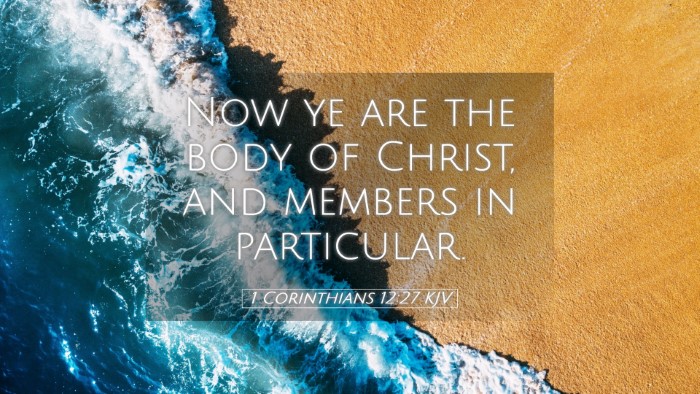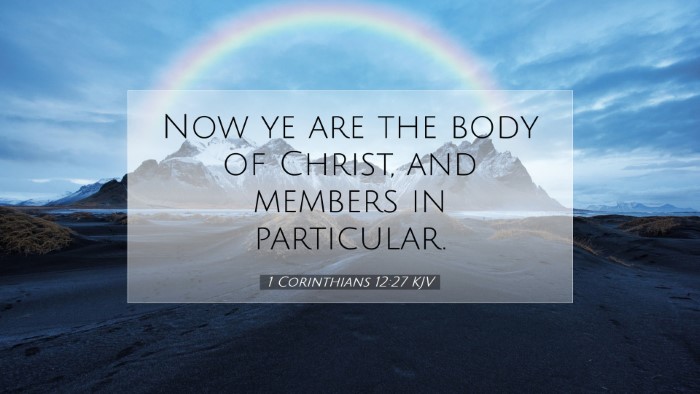Commentary on 1 Corinthians 12:27
Verse: "Now you are the body of Christ, and each one of you is a part of it." (1 Corinthians 12:27, NIV)
Introduction
This verse encapsulates the profound theological truth that believers in Christ collectively form His Body. In the context of the Apostle Paul's letter to the Corinthians, he addresses issues concerning unity and diversity within the body of Christ, emphasizing each believer's unique role and contribution.
Context
The Church in Corinth faced divisions and disputes, largely due to spiritual gifts and the role of individuals within the community of believers. Paul, inspired by the Holy Spirit, sought to clarify the nature of the Church as a unified body made up of diverse parts.
Exegesis
1 Corinthians 12:27 draws a vivid metaphor comparing the Church to a human body. This metaphor serves multiple purposes:
- Unity in Diversity: Each member of the body has a unique function, yet all contribute to the whole. Just as a human body requires hands, feet, eyes, and ears, the Church consists of various members, each called to serve in distinct ways.
- Mutual Interdependence: No part can exist in isolation; similarly, Christians are designed for fellowship and interdependence within the body of Christ.
- Divine Purpose: God has sovereignly arranged each member's function for the edification of the Church, highlighting His wisdom and love in the diverse gifts granted to believers.
Insights from Public Domain Commentaries
Matthew Henry's Commentary
Matthew Henry emphasizes that here, Paul is addressing the Church's organizational structure as the Body of Christ. He comments on the harmony that should exist among believers:
"A body is a complete and fitly joined structure. All the parts contribute to the function of the whole, no individual stands alone. This signifies that personal pride over one’s gifts is antithetical to the spirit of unity that should prevail in the body of Christ."
Henry also notes that the location of this declaration, following the teaching on spiritual gifts, underscores the fact that every gift is vital for the Church's health and mission.
Albert Barnes' Commentary
Albert Barnes elaborates on the implications of being part of the body of Christ, pointing to several critical aspects:
- Belonging: The phrase “you are the body” denotes belonging and identity; Christians must understand that being part of Christ's body is their fundamental identity.
- Function: Each believer possesses specific gifts for an intended purpose in the wider scope of the Church’s mission, contributing to both the whole and to individual edification.
- Accountability: Membership in the body implies responsibility towards one another; this community must nurture and care for each member in love, reflecting Christ’s sacrifice.
Adam Clarke's Commentary
Adam Clarke reflects on the significance of the phrase "each one of you is a part of it," positing that:
"The diversity of roles within the Church does not diminish the value of any one member; rather, it highlights the collaborative mission of the Church under the headship of Christ."
Clarke emphasizes how this unity in diversity speaks of the nature of the Church’s mission, encouraging every believer to discover and operate in their God-given giftings.
Theological Implications
This verse contains profound implications for understanding Church theology:
- Ecclesiology: The nature and function of the Church as the Body of Christ leads to a re-evaluation of how churches operate, fostering a culture of empowerment and collaboration.
- Spiritual Gifts: Individual gifts are to be celebrated and utilized within the body, reminding believers that the diversity of gifts strengthens the witness of the Church to the world.
- Christology: The term "Body of Christ" emphasizes Christ's ongoing presence and ministry on earth through His Church, positioning believers as extensions of Christ's hands and feet.
Practical Applications
For pastors and church leaders, this verse carries practical applications:
- Encouraging Participation: Leaders should cultivate environments where each member feels valued and is encouraged to identify their spiritual gifts and serve accordingly.
- Promoting Unity: Amidst diversity, the Church should prioritize unity in purpose and mission, reminding members that they collectively represent Christ.
- Fostering Relationships: Building strong, interpersonal relationships in the Church community will enhance mutual support and accountability, ensuring that all parts of the body work together effectively.
Conclusion
1 Corinthians 12:27 succinctly captures the essence of Christian community as the Body of Christ. It serves as a powerful reminder of the individual and collective responsibility believers share in fulfilling God's purpose in the world. Through the insights provided by esteemed commentators, the significance and application of this verse become clearer, urging all believers to recognize their vital role in the Church's mission.


